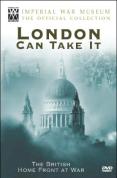 Britain's Home Front At War - London Can Take It | DVD | (12/02/2007)
from £11.43
| Saving you £1.56 (13.65%)
| RRP
Britain's Home Front At War - London Can Take It | DVD | (12/02/2007)
from £11.43
| Saving you £1.56 (13.65%)
| RRP This collection features seven different wartime films looking at life in London from the outbreak of war through the Blitz to the V-Bomb menace. London Can Take It! (1940): This celebrated film co-directed by Humphrey Jennings was aimed at American audiences with reporter Quentin Reynolds praising the courage and resilience of Londoners during the Blitz. The First Days (1939): A quiet portrait of London in the first days after war had been declared awaiting the inevitable onslaught. Neighbours Under Fire (1940): This inspiring short film shows Londoners rallying around to help one another during the fury of the Blitz when - in just one night alone - 1200 people suddenly found themselves homeless. Christmas Under Fire (1941): A moving and vivid portrait of Christmas 1940 when Londoners swapped the intimacy of the fireside for shelter in the capital's tube stations. Ordinary People (1942): A day in the life of ordinary Londoners trying to get on with their lives and contribute to the war effort - and waiting for the seemingly inevitable air raid sirens to sound again. London Scrapbook (1942): Bessie Love Basil Radford & Leslie Mitchell star in this vivid portrait of London at war intended for American audiences to help them appreciate the experience of living in a war-torn city. Second Battle Of London (1944): A tribute to the work of Anti-Aircraft Command under General Sir Frederick Pile in defending London against waves of German V-1 Flying Bombs.
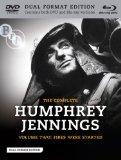 The Complete Humphrey Jennings: Volume 2 (DVD & Blu-ray) | Blu Ray | (23/04/2012)
from £18.98
| Saving you £3.00 (17.66%)
| RRP
The Complete Humphrey Jennings: Volume 2 (DVD & Blu-ray) | Blu Ray | (23/04/2012)
from £18.98
| Saving you £3.00 (17.66%)
| RRP Widely considered to be one of Britain’s greatest filmmakers, Humphrey Jennings has long been celebrated as the director of works which beautifully capture the everyday heroism in times of war and peace. This, the second of three volumes which collect together Jennings’ entire output, gathers 5 films from 1941 -1943 and shows Jennings at the pinnacle of his career. It features his masterpieces Listen to Britain and Fires Were Started and the rousing Words for Battle as well as some previously neglected works and alternative versions, many of which are made available for the first time since their original release. Special features: Contents: Listen To Britain (1941); Words for Battle (1941); The Heart of Britain (1941); Fires Were Started (1943); The Silent Village (1943) All films presented in both High Definition and Standard Definition This Is England (1941): alternate cut of The Heart of Britain I Was a Fireman (1943): Jenning’s original cut of Fires Were Started Illustrated booklet with newly commissioned essays, film notes, and biography
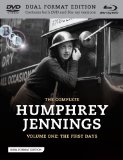 The Humphrey Jennings Collection Volume 1 (DVD + Blu-ray) | Blu Ray | (19/09/2011)
from £17.99
| Saving you £2.00 (11.12%)
| RRP
The Humphrey Jennings Collection Volume 1 (DVD + Blu-ray) | Blu Ray | (19/09/2011)
from £17.99
| Saving you £2.00 (11.12%)
| RRP Humphrey Jennings, widely considered as one of Britain's greatest documentary filmmakers, is best known for films which beautifully evoke everyday heroism in times of war and peace, combining poetic observation with a subtle yet intense national feeling.This, the first of three volumes, gathers 15 films from the period 1934-1940 and provides a fascinating insight into Jennings early days as a filmmaker learning and developing his craft. It features the critically acclaimed Spare Time and London Can Take It! as well as some previously neglected works, many of which will be available for the first time since their original release.
![Land of Promise [DVD]](/pictures/1126181.jpg) Land of Promise | DVD | (04/03/2013)
from £25.89
| Saving you £4.10 (15.84%)
| RRP
Land of Promise | DVD | (04/03/2013)
from £25.89
| Saving you £4.10 (15.84%)
| RRP Featuring 40 films by such luminaries as Humphrey Jennings Paul Rotha and Ruby Grierson this collection is a major retrospective of the British documentary film movement during its period of greatest influence. The diverse and compelling films contained here - many of which are made available for the first time since their original release - bear witness to the social and industrial transformations of a rapidly changing world. This unique collection captures the spirit and strength concerns and resolve of Britain and its people before during and immediately after the Second World War. A companion collection Shadows of Progress: Documentary film in post-war Britain 1951-1977 is also available on BFI DVD. Special Features: Includes fully illustrated 96 page perfect bound book with contextualising essays on all of the films Includes interviews with some of the directors featured on the discs Includes a 15 minute film of John Grierson (the 'father' of documentary) at the National Film Theatre in 1959
![The Complete Humphrey Jennings volume 3: A Diary for Timothy [Blu-ray] [DVD]](/pictures/1122482.jpg) The Complete Humphrey Jennings volume 3: A Diary for Timothy | Blu Ray | (15/07/2013)
from £18.98
| Saving you £3.00 (17.66%)
| RRP
The Complete Humphrey Jennings volume 3: A Diary for Timothy | Blu Ray | (15/07/2013)
from £18.98
| Saving you £3.00 (17.66%)
| RRP This Dual Format Edition completes the BFI's acclaimed Complete Humphrey Jennings collection making available all the films directed by Britain's greatest filmmakers available on Blu-ray and DVD. The films of Humphrey Jennings have proved hugely influential over the last 60 years - his influence can be felt in the work of Lindsay Anderson (If...) and more recent filmmakers such as Kevin MacDonald (Touching the Void Marley). Jennings was also a major influence for Frank Cottrel Boyce and Danny Boyle whose 2012 Olympics ceremony used Jennings' book Pandæmonium as its inspiration. Films Comprise: The Eighty Days (1944) A Diary for Timothy (1945) A Defeated People (1946) The Cumberland Story (1947) The Dim Little Island (1949) Family Portrait (1950) Special Features: V.1 (1944): a shorter cut of The Eighty Days made for overseas distribution The Good Life (1951): Jennings' final film
![The Humphrey Jennings Collection [1942]](/pictures/1010993.jpg) The Humphrey Jennings Collection | DVD | (25/07/2005)
from £20.37
| Saving you £-0.38 (N/A%)
| RRP
The Humphrey Jennings Collection | DVD | (25/07/2005)
from £20.37
| Saving you £-0.38 (N/A%)
| RRP Features three films from the man described by Lindsay Anderson as 'the only true poet of the English cinema'. Diary For Timothyis a true masterpiece and as real today as it was 60 years ago. Set at the end of 1944 with victory inevitable and a nation wearied by war Jennings makes a film diary for the newborn Timothy Jenkins capturing the world he is born into. Scripted by EM Forster and narrated by Michael Redgrave it uses the viewpoints of an ordinary farmer a fighter pil
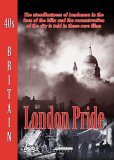 40's Britain - London Pride | DVD | (15/05/2006)
from £22.98
| Saving you £-2.99 (-15.00%)
| RRP
40's Britain - London Pride | DVD | (15/05/2006)
from £22.98
| Saving you £-2.99 (-15.00%)
| RRP A collection of rarely-seen films showing the effect of the blitz on London and its people and the plans for the post-war regeneration of the City. Includes: London Can Take It (1940): GPO Film Unit. Directors Harry Watt & Humphrey Jennings. This film about Londoners under seige during the blitz seen in the very rare American version was narrated by American journalist Quentin Reynolds. It was instrumental in persuading the USA to support Britain during World War II. The Proud City (1945): London County Council's plans for re-developing the city. Scored by William Alwyn. London Airport (1949): The construction of Heathrow Airport Moving Millions(1947): The post war changes in London Transport Journey On A London Bus (1950): Two African students sample the pleasures of travelling on London's buses which are always on time.
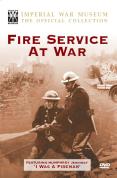 Fire Service At War - An IWM Ofiicial Collection | DVD | (14/05/2007)
from £N/A
| Saving you £N/A (N/A%)
| RRP
Fire Service At War - An IWM Ofiicial Collection | DVD | (14/05/2007)
from £N/A
| Saving you £N/A (N/A%)
| RRP The Imperial War Museum Collection features rare and fascinating original films preserved in the Museum's archive. These films are of great historical importance and are essential viewing for anyone interested in British military history. The Fire Sevice At War features three intriguing films looking at the role of the Fire Service in Wartime England: I Was A Fireman (1943) Tells the story of one day in the life of an Auxiliary Fire Service (AFS) unit during the height of the Blitz. The Auxiliary Fire Service was formed in 1938 as back up to the regular fire service in case Britain's cities ever faced mass bombing from the air. Its members were all 'amateurs'. Although it features a dramatised re-staging I Was a Fireman uses no actors. The cast is made up entirely of genuine AFS fire fighters who served during the Blitz. Fire Services At War (1946) This film provides a fascinating look at the preparations for war through to 1945. It covers recruitment training action under fire during the Blitz the reorganisation of the Fire Service the renewed threat posed by V-weapons during 1944 and - at war's end - the Royal salutes to the men and women who served so valiantly through the years. Fires of London (1945) This is a vivid account of the London Blitz of 1940-1941 with considerable coverage of the threat posed by fire. It includes shots of a burning oil-depot the story of the great fire raid of December 29th 1940 a look at water-supply problems and an account of the last great fire attack in May 1941.
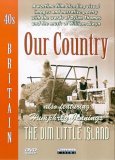 40's Britain - Our Country / The Dim Little Island | DVD | (22/08/2005)
from £26.98
| Saving you £-6.99 (N/A%)
| RRP
40's Britain - Our Country / The Dim Little Island | DVD | (22/08/2005)
from £26.98
| Saving you £-6.99 (N/A%)
| RRP A sailor on leave in Our Country finds wartime Britain in good spirits in this experiment with narrative poetry on screen. With the words of Dylan Thomas and the music of William Alwyn. The Dim Little Island by Humphrey Jennings his penultimate film dispels the myth of the British being a dull insular race as it explores the achievements of Britain and its people. Featuring Osbert Lancaster cartoonist Ralph Vaughan Williams composer James Fisher naturalist and John Ormston industrialist.
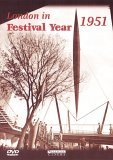 London In Festival Year 1951 | DVD | (20/11/2006)
from £20.00
| Saving you £-0.01 (N/A%)
| RRP
London In Festival Year 1951 | DVD | (20/11/2006)
from £20.00
| Saving you £-0.01 (N/A%)
| RRP A collection of films in celebration of the 1951 Festival of Britain. Features the last films made by Humphrey Jennings (Family Portrait) and Richard Massingham (Brief City). Also includes Festival in London with a rousing score by William Alwyn and Designed in Britain with Terence Conran as Technical advisor.
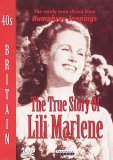 40s Britain - The True Story Of Lili Marlene | DVD | (08/01/2007)
from £N/A
| Saving you £N/A (N/A%)
| RRP
40s Britain - The True Story Of Lili Marlene | DVD | (08/01/2007)
from £N/A
| Saving you £N/A (N/A%)
| RRP Marius Goring narrates Humphrey Jennings' film of the extraordinary story of Lale Andersen the singer whose record became a battle song for troops on both sides in World War II. Goebbels detested the song and contrived to have Andersen placed in a concentration camp. Also features Before The Raid another true story of Norwegian fishermen repelling German soldiers who were plundering their catch from their small fishing village.
 30's Britain Volume 1 - GPO Classic Collection | DVD | (31/07/2006)
from £21.58
| Saving you £-5.59 (N/A%)
| RRP
30's Britain Volume 1 - GPO Classic Collection | DVD | (31/07/2006)
from £21.58
| Saving you £-5.59 (N/A%)
| RRP Granton Trawler (1934): directed by John Grierson. About a trawler fishing on the Viking Bank. Coal Face (1935): directed by Alberto Cavalcanti. An experiment in sound in a coal mine. A Job In A Million (1940): directed by Evelyn Spice. A young cockney lad trains as a messenger boy with the Post Office. Spare Time (1939): directed by Humphrey Jennings. Workers in the steel cotton and coal industries at leisure. The City (1939): directed by Ralph Elton. The growth and development of London. How the Post Office helped
![London Can Take It [DVD]](/pictures/1133469.jpg) London Can Take It | DVD | (28/07/2014)
from £13.05
| Saving you £-0.06 (N/A%)
| RRP
London Can Take It | DVD | (28/07/2014)
from £13.05
| Saving you £-0.06 (N/A%)
| RRP This collection features seven different Second World War films about life in London from the outbreak of war through the Blitz to the V-Bomb menace. LONDON CAN TAKE IT (1940) This celebrated film, co-directed by Humphrey Jennings, was aimed at American audiences, with reporter Quentin Reynolds praising the courage and resilience of Londoners during the Blitz. THE FIRST DAYS (1939) A quiet portrait of London, as citizens brace themselves for the onslaught of war. NEIGHBOURS UNDER FIRE (1940) .
 40's Britain - At The Coal Face | DVD | (15/05/2006)
from £N/A
| Saving you £N/A (N/A%)
| RRP
40's Britain - At The Coal Face | DVD | (15/05/2006)
from £N/A
| Saving you £N/A (N/A%)
| RRP Humphrey Jennings' The Cumberland Story (1947) tells about conditions in Britain's mines and the events leading to nationalisation taking the Cumberland coalfields as an example where improvements in safety and productivity were most in need. Plus Rhondda and Wye (1948) a comparison of the two famous Welsh Valleys and how one developed as a mining area and the other as pastural farmland.
![I Was A Fireman [1942]](/pictures/1081532.jpg) I Was A Fireman | DVD | (28/04/2008)
from £12.98
| Saving you £-2.99 (N/A%)
| RRP
I Was A Fireman | DVD | (28/04/2008)
from £12.98
| Saving you £-2.99 (N/A%)
| RRP Features three films from the man described by Lindsay Anderson as 'the only true poet of the English cinema': The feature-length I Was a Fireman the story of 24 hours in the life of a fire crew during the Blitz is an innovative work that should be as iconic to British cinema as Vigo's L'Atalante is to French. In Listen to Britain Jennings collects and edits the sounds and sights of wartime Britain into an extraordinarily moving and effective collage. Diary for Timothy is a film that is relevant for every generation and bears repeated viewings. The latter two films are struck from newly made BFI prints.
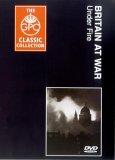 Britain At War - Under Fire | DVD | (14/11/2005)
from £25.90
| Saving you £-9.91 (-62.00%)
| RRP
Britain At War - Under Fire | DVD | (14/11/2005)
from £25.90
| Saving you £-9.91 (-62.00%)
| RRP Story Of An Air Communique (1940): with men of the Royal Air Force. Processing the figures for destoyed enemy aircraft. Britain Can Take It (1940): directed by Humphrey Jennings and Harry Watt. Presented by US journalist Quentin Reynolds. Used by President Roosevelt to help swing US opinion behind Britain. Britain At Bay (1940): commentary by J.B. Priestley. Czechoslovakia Poland Norway Holland and Belgium have fallen ... Men of the Lightship (1940): directed by David MacDougall. The Luftwaffe bombing of the East Dudgeon Lightship. Christmas Under Fire (1941): directed by Harry Watt. A Quentin Reynolds despatch from London to America showing Christmas in the Blitz.
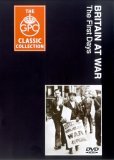 Britain At War - The First Days | DVD | (14/11/2005)
from £21.58
| Saving you £-5.59 (-35.00%)
| RRP
Britain At War - The First Days | DVD | (14/11/2005)
from £21.58
| Saving you £-5.59 (-35.00%)
| RRP The First Days (1939): directed by Harry Watt Humphrey Jennings and Pat Jackson - Preparation for war on the home front. The Front Line (1939): directed by Harry Watt. Dover becomes a target for the Germans. Squadron 992 (1940): directed by Harry Watt. A barrage balloon squadron is trained and deployed to South Queensferry to defend Rosyth Naval Base and the Forth Bridge. Includes a reconstruction of the Luftwaffe raid of October 16 1939.
 40s Britain - Women And Children At War | DVD | (20/11/2006)
from £32.37
| Saving you £-12.38 (-61.90%)
| RRP
40s Britain - Women And Children At War | DVD | (20/11/2006)
from £32.37
| Saving you £-12.38 (-61.90%)
| RRP A wonderful collection of war-time documentary shorts depicting the lives of women and children. Evacuees land girls factory workers doughty countrywomen confronting Nazi paratroopers and of course the Women's Institute are all here. Don't miss this one. Programme includes: Land Girl (1942) Miss Grant Goes To The Door (1940) Our School (1941) Bampton Shows The Way (1941) Westward Ho (1940) Living With Strangers (1941) The Countrywomen (1942) Worker's Week-end (1943).
![40s Britain - Welcome To Britain Collection [DVD]](/pictures/1128995.jpg) 40s Britain - Welcome To Britain Collection | DVD | (10/11/2008)
from £53.98
| Saving you £-20.99 (N/A%)
| RRP
40s Britain - Welcome To Britain Collection | DVD | (10/11/2008)
from £53.98
| Saving you £-20.99 (N/A%)
| RRP Three more superb DVDs from our famous 40s Britain documentary film series about the Britain in the 1940s, packaged together in a bargain priced collection in a standard-sized DVD case. Includes the following DVDs: Over Paid Over Sexed and Over Here, Women & Children At War, and The True Story of Lili Marlene.

Please wait. Loading...
This site uses cookies.
More details in our privacy policy